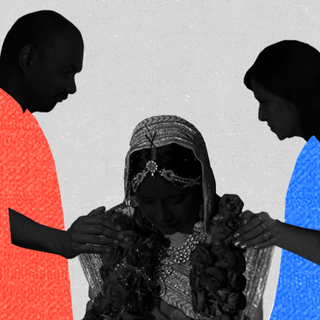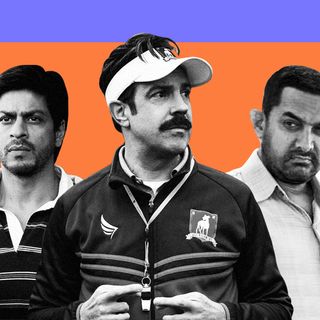
It’s Okay: To Not Forgive and Forget
It is not the worst thing in the world to keep some people out of your life.

In It’s Okay, we defend our most embarrassing, unpopular opinions.
If there were a playbook of human behavior, lesson one would most likely be about forgiveness. There’s something generous and humane about letting go of the hurt, no? Forgiveness is also an attribute of the strong, they say, a trait that has seen as much popularity in real life as in cinematic depictions. Story arcs of hurt and betrayal followed by characters forgiving the person for moving on — ah, the novelty indeed.
I want to shed my cynicism and invest ardently in this “journey” of moving on. I truly do. But my gripe is simple: this idealistic narrative has become a convenient ground to excuse shitty people and shitty behavior. Not just that, the association of forgiveness with strength and moral superiority is wildly dismissive of genuine emotions and experiences.
So while “forgive and forget” is the rulebook for getting closure, it is not the worst thing in the world to hold on to grudges.
If anything, it’s a sign of self-respect, of taking stock of what one deserves. People who acknowledge boundaries, who know who should be in their lives and who shouldn’t, come from a place of self-awareness. People must not compel them to “forgive” just because it’s the “right” thing to do. To not hurt people is the right thing to do too, but some still do it. Don’t confuse this with ego or stubbornness; no, the unwillingness to forgive can also speak to more confident, sacred feelings of self-worth.
Plus, you can still move on and “heal” without letting people back into your life. Sure, a lack of acceptance of others signals a lack of acceptance of oneself. There’s probably nothing more powerful than taking the time to heal at one’s own pace — it is all shades of empowering and worthy. But when people accept and make personal amends with themselves, is it a rule of nature that people from before deserving a free ride into this new world of growing? Moving on is a personal act that shouldn’t be attached to how much or how little people forgive someone. It is still closure if people move on without granting that halo of forgiveness.
The benevolence of forgiving also has side effects. Forgiveness actively interacts with feelings of self-worth and respect. Every act of forgiveness represents a power dynamic. Research shows the person with power in a relationship is less likely to forgive than the person without it. The outcome is then in the hands of the transgressors, and if the transgressor continues to inflict the same wounds, the person who forgave is more likely to experience a drop in self-esteem. A study showed that forgiving too readily can erode self-respect and lead to more significant relationship problems and more disagreeable partners.
Related on The Swaddle:
Why We Enjoy Revenge Stories Much More Than Stories About Forgiveness
This trend is so common that it has its psychological name: the “Porcupine Embrace,” as psychologist Frank Fincham called it. “In the cold, two porcupines hug each other to stay warm, getting closer and closer, until one’s spikes begin to penetrate each other’s skin. Then they separate, but when the cold grips them again, they come back too close until they get hurt,” Psychology Spot noted, explaining this dynamic is oft-repeated in interpersonal relationships too. Forgiveness is a slippery slope. It turns out when people forgive someone. According to research, they are more likely to forget the offense that made them angry in the first place.
In a 2011 study, Professor James K. McNulty, an associate psychology professor at the University of Tennessee, found that partners who forgave quickly were almost twice as likely to be mistreated soon afterward. “It’s as if ‘apology accepted’ can be the marital equivalent of feeding the kids Pop Rocks for supper,” journalist Paul Kix wrote in The Cut. This unconditional forgiveness has come to be known as the “Doormat Effect.” True to its name, the cycle of forgiveness makes people more likely to be stepped on.
Much of society’s angst against holding on to grudges come from a place of insecurity. Anger is an unfamiliar, little understood emotion. This makes it easy for people to have unhealthy ways of dealing with anger, but accepting cutting people out of life without forgiveness can change this dynamic. Anger can be healing and productive; one has to know how little or how much to hold on to it. Do you know how Bruce Banner comes to peace with Hulk in The Avengers movies? He’s always angry, he says, in that anger is an integral part of him. Accepting that helps to control it.
What’s most critical in this negotiation of mercy is understanding everyone’s pain is different. Asking people to forgive, or demanding people’s forgiveness, is profoundly ignorant. “…the attitude behind these statements can shame people, making them think that something is wrong with going through a natural process of healing after injury or betrayal where forgiveness may not be the first (or second or third) step,” Psychology Today noted. “These assumptions and judgments not only dismiss the real pain many people suffer; they discourage intelligent analysis of the traumas many people and groups experience.”
Mercy is beautiful, but you can not force it. And showing people the door has excellent potential to set you free.
The resistance to forgiving is as much an individual rebellion as it is a social one. It is this act of mercy that allows humans to wield moral superiority. The question then is: who are we without our constant ability to forgive and forget? Still, people, flawed in different measures, erect boundaries and exercise personal choice depending on their emotional bandwidths.
It’s okay to take a cue from the person in this article’s image then and cut people out of your life.
Saumya Kalia is an Associate Editor at The Swaddle. Her journalism and writing explore issues of social justice, digital sub-cultures, media ecosystem, literature, and memory as they cut across socio-cultural periods. You can reach her at @Saumya_Kalia.
Related


The Buzz Cut: Indian Politicians Are Using Dua Lipa’s ‘Sugarboo’ to Promote Their Campaigns
